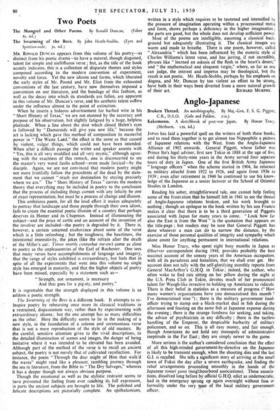Two Poets
The Swarming of the Bees. By John Heath-Stubbs. (Eyre and Spottiswoode. 7s. 6d.) MR. RONALD DUNCAN appears from this volume of his poetry—as distinct from his poetic drama—to have a natural, though disguised, talent for simple and mellifluous verse ; but, as the title of the book acutely indicates, this is a collection of disparate themes and styles composed according to the modern convention of experiment, novelty and force. Yet the new idioms and forms, which liberated the early styles of Mr. Pound and Mr. Eliot from the exhausted conventions of the last century, have now themselves imposed a convention on our literature, and the bondage of this fashion, as well as the decay into which its standards are fallen, are apparent in this volume of Mr. Duncan's verse, and his aesthetic talent suffers under the influence almost to the point of extinction.
When he inserts a hideous advertisement for barbed wire in his " Short History of Texas," we are not stunned by the accuracy and purpose of his observation, but slightly fatigued by a huge, helpless platitude. When a line about the dust which closed Helen's eyes is followed by " Damaroids will give you new life," because the art is lacking which gave this method of composition its masterful power in " The Waste Land," the effect is the same as that caused by violent, vulgar things, which could not have been intended. When after a difficult passage the writer and speaker assents with " Yes, this is all very muddled and all very mystic," although agree- ing with the exactness of this remark, one is disconcerted to see the master's very worst faults echoed—even made farcical—by the disciple. Again, we are not convinced that modern poetry might not more fruitfully follow the precedents of the dead by the state- ment that we cannot " reach our destination by staying precisely where we are." The " Short History of Texas " carries the modern theory that everything may be included in poetry to the conclusion that the process of including things cannot with any felicity be one of exact representation, but must be a process of change and illusion.
This ambitious poem, for all the loud effort it makes adequately to portray that landscape and those people through their own idiom, fails to create the essential poetic illusion of a country that perhaps deserves its Homer and its Chapman. Instead of illuminating the subject—and the price of cattle and an account of the invention of the revolver are included—the poetry is degraded by it. There is, however, a certain untamed exuberance about some of the verse which is a little refreshing ; but the toughness, the heartiness, the intentional insensitivity, the jokes (like the refrain after the death
of the Miller's cat: Timor mortis conturbat me-ow) come as close
to poetry as the unpleasantries of the Earl of Rochester. One sees
that many verses have accomplishments of language and imagery, that the range of styles exhibited is extraordinary, but feels that in spite of all the experiments that went into this volume no single style has emerged in maturity, and that the higher objects of poetry have been missed, especially by a- statement such as-
" Strength, not ornament, is necessary And that goes for a pig-sty, and poetry."
It is regrettable that the strength displayed in this volume is so seldom a poetic strength.
The Swarming of the Bees is a different book. It attempts to re- Inspire poetry by rehearsing once more its classical traditions in a restrained, dispassionate way, rather than by experimenting with extraordinary idioms: but the one attempt has as many difficulties as the other. Here the difficulty seems to lie in the making of a new style, in the foundation of a solemn and ceremonious verse that is not a mere reproduction of the style of old 'masters. By the careful, sensitive attention given to the vivid descriptions, to the detailed illumination of scenes and images, the danger of being imitative where it was intended to be elevated has been avoided. Although part of the method of the verse is to recall an ancient subject, the poetry is not merely that of cultivated recollection. For instance, the poem " Through the dear might of Him that walk'd the waves" might read like a pleasant, rambling journey through the sea in literature, from the Bible to " The Dry Salvages," whereas it has a deeper though not always obvious purpose.
Though the emotional as well as the stylistic restraint seems to have prevented the feeling from ever retching its full expression, in parts the ancient subjects are brought to life. The polished and delicate descriptions are pictorially complete. An epithalamium,
written in a style which requires to be tautened and intensified by the pressure of imagination operating within a processional- metre and form, shows perhaps a deficiency in the higher imagination ; the parts are good, but the whole does not develop sufficient power.
Most of the poems are intelligible, assuming a classical back- ground but adequately illustrating it. The classical images are warm and made to breathe. There is one poem, however, called " Alexandria " which has been influenced by the esoteric style of Charles Williams's latest verse, and has jarring, if not incredible, phrases like " learned an askesis of the flesh in the heart's desert," and " the mathematical and eloquent virgin," where, so far as one can judge, the interest and impetus may be theological, but the result is not poetic. Mr. Heath-Stubbs, perhaps by his emphasis on dogma, and Mr. Duncan by too violent an effort to be strong, have both in their ways been diverted from a more natural growth of their art. RICHARD MURPHY.


































 Previous page
Previous page